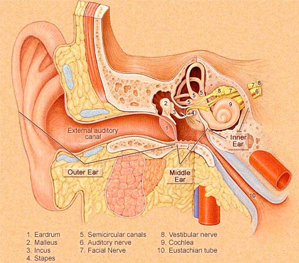Hearing Loss
- You may have hearing loss, and not even be aware of it
- People of all ages experience gradual hearing loss, often due to the natural aging process or long exposure to loud noise
- Other causes of hearing loss include viruses or bacteria, heart conditions or stroke, head injuries, tumours, and certain medications
- Treatment for hearing loss will depend on your diagnosis
Ear anatomy

How does the ear work?
- The ear or hearing-sense is a complex and intricate process
- The ear is made up of three sections:
- The outer ear
- The middle ear
- The inner ear
- These parts work together so you can hear and process sounds
- The outer ear, or pinna (the part you can see), picks up sound waves and the waves then travel through the outer ear canal
- When the sound waves hit the eardrum in the middle ear, the eardrum starts to vibrate
- When the eardrum vibrates, it moves three tiny bones in your ear
- These bones are called the hammer (or malleus), anvil (or incus), and stirrup (or stapes)
- They help sound move along on its journey into the inner ear
- The vibrations then travel to the cochlea, which is filled with liquid and lined with cells that have thousands of tiny hairs on their surfaces
- The sound vibrations make the tiny hairs move
- The hairs then change the sound vibrations into nerve signals, so your brain can interpret the sound
Test your hearing
Signs that you have a hearing problem include:
- Having a problem hearing over the telephone
- Trouble following the conversation when two or more people are talking at the same time
- People complain that you turn the TV volume too high
- Having to strain to understand conversations
- Missing hearing some common sounds like the phone or doorbell ring
- Having trouble hearing conversations in a noisy background, such as a party
- Getting confused about where sounds come from
- Misunderstanding some words in a sentence and needing to ask people to repeat themselves
- Especially have trouble understanding the speech of women and children
- Many people you talk to seem to mumble, or don’t speak clearly
- People get annoyed because you misunderstand what they say
- Misunderstanding what others are saying and make inappropriate responses
- Avoiding social activities because you cannot hear well and fear you’ll make improper replies
- A family member or friend thinks you have a problem hearing
Common risk factors for hearing problems
- People who worked in noisy environments (such as assembly lines, construction sites, or near jet engines)
- People with a history of ear infections
- Those with a family history of hearing problems
What can you do to improve your hearing?
- Eliminate or lower unnecessary noises around you
- Let friends and family know about your hearing loss and ask them to speak slowly and more clearly
- Ask people to face you when they are speaking to you, so you can watch their faces and see their expressions
- Utilise sound amplifying devices on phones
- Use personal listening systems to reduce background noise
Tips to maintain hearing health
- If you work in noisy places or commute to work in noisy traffic or construction, choose quiet leisure activities instead of noisy ones
- Develop the habit of wearing earplugs when you know you will be exposed to noise for a long time
- Wear earplugs if you work in a noisy environment – earplugs quiet about 25 dB of sound and can mean the difference between a dangerous and a safe level of noise
- Try not to use several noisy machines at the same time
- Try to keep television sets, stereos and headsets low in volume




